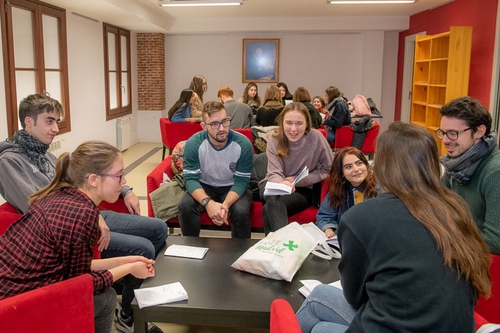Commented Bible Passages
November
One of the criminals who hung there hurled insults at him: “Aren’t you the Messiah? Save yourself and us!” But the other criminal rebuked him. “Don’t you fear God,” he said, “since you are under the same sentence? We are punished justly, for we are getting what our deeds deserve. But this man has done nothing wrong.” Then he said, “Jesus, remember me when you come into your kingdom.” Jesus answered him, “Truly I tell you, today you will be with me in paradise.” (Luke 23:39-43)
Two criminals are crucified next to Jesus. Despite their suffering and their exhaustion, these two men cannot help but look at him, just like the people (v. 35) and the friends of Jesus (v. 49) do. Jesus on the cross remains a challenge; no one around him can remain indifferent.
The leaders and the soldiers see there a reason to mock him (vv. 35-36). One of the criminals insults Jesus. Why doesn’t Jesus save him, if he has the power to do so? That man asks Jesus to use what he has received from God for his well-being, to make his life easier. And also to accomplish quickly his mission to save others: if he is the Messiah, why doesn’t he help those two crucified men at the end of their life, as he helped so many sick people? If he is the Messiah, why doesn’t he save these two poor dying men, in this way following his Father, who “is good to the ungrateful and the wicked” (Luke 6:35)? “Save us,” asks the criminal on the cross.
The other criminal rebukes the first one. He speaks of a “fear of God” that leads him to recognize his own guilt and Jesus’ innocence. A fear that, far from paralyzing him, opens up for him a hope. At the cross, he finds the courage to think of the future and the strength to pray to Jesus, asking him not to forget him in his kingdom. But his prayer is humble; it does not demand anything. It is an honest prayer; his words show his sincerity: he does not hide the evil he has done. And it is a prayer full of trust, for he knows that Jesus will come as king, even if before him he only sees a crucified man about to die. This second criminal has no illusions about his own abilities; he needs Jesus to remember him in order to support him and take care of him. He knows that Jesus’ remembering will be enough to save him. He too asks to be saved.
Jesus does not answer the first criminal. Behind his request, apparently legitimate, is hidden in reality the voice of the tempter (see Luke 4:9). Jesus does not allow himself to be drawn into this kind of provocation. When his friend Peter told him that he should not take the way of the cross, Jesus had replied with harsh and clear words: “Get behind me, Satan! You are an obstacle to me.” (Matthew 16:23)
To the second criminal, who shows great faith, Jesus offers his fellowship and promises the fullness of life: “Today you will be with me in paradise.” A formal promise, with the seal of his authority: “Truly I tell you.” These words of Jesus are surprising. On the cross, Jesus opens his arms to forgive someone who says he deserves capital punishment for his crimes. And this criminal may be the first person to be with Jesus in paradise. Jesus’ love always surprises us.
In each of us there are many different voices that try to express themselves. Among them there are the cries of these two criminals. Following the first voice leads to an attitude of accusation, to withdrawal into ourselves and to distancing ourselves from God and from others. Listening to the second voice and giving it precedence can help us to open our eyes in order better to accept what we are, to recognize God’s presence where we did not expect to find it and to ask him to support us. It is an attitude that liberates us.
![]() What helps me to discern the traps that can be hidden in the voices around me? Where can I find the courage not to remain fixed on them?
What helps me to discern the traps that can be hidden in the voices around me? Where can I find the courage not to remain fixed on them?
![]() Have I already had the experience of feeling liberated before the cross? Does the criminal’s prayer help me to find inner peace?
Have I already had the experience of feeling liberated before the cross? Does the criminal’s prayer help me to find inner peace?
 TAIZÉ
TAIZÉ